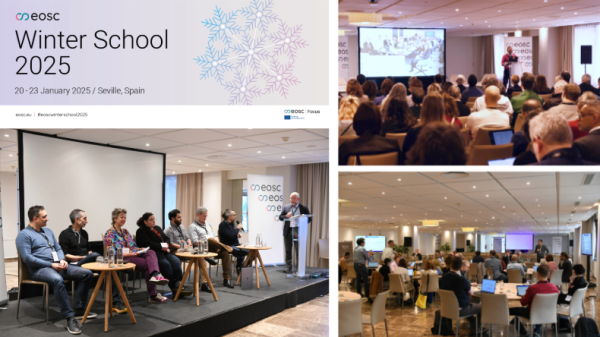The second edition of 2025 of the EOSC Winter School took place from 20th to 23rd January in Seville, under the organisation of the EOSC Association, with the support of the EOSC Focus.
TITAN was present, along with 150 other participants, including representatives from EOSC-related projects funded through Horizon Europe, EOSC Opportunity Area Expert Groups, EOSC-A Task Forces, the European Commission, and the EOSC-A Board and Secretariat.

The event programme was shaped on the four Strategic Pillars that group the priorities listed in the EOSC Multi-Annual Roadmap (MAR) for the years 2026 and 2027. The four Strategic Pillars are:
- Strategic Pillar 1 – Sustaining and enhancing the EOSC Federation.
- Strategic Pillar 2 – Contributing to the web of FAIR data and the uptake of AI.
- Strategic Pillar 3 – Ensuring research security and sovereignty.
- Strategic Pillar 4 – Linking with other Common European Data Spaces and beyond.
On the main stage it was explored key themes shaping the EOSC ecosystem, but there were also breakout sessions with presentations and interactive workshops to discuss how to align with the Strategic Pillars.
During the Winter School there was also the opportunity for the official launch of the new EOSC Opportunity Area Expert Group for Research Software.
The Key outcomes
From this event, four major outcomes arise, one associated with each of the Strategic Pilars:
- Sustaining and enhancing the EOSC Federation – Strategic Pillar 1 discussions highlighted the need for robust governance and a dedicated body for Persistent Identifiers (PIDs). Harmonised definitions, metadata standards, and a shared technical architecture are crucial for interoperability and engagement. Existing solutions should be promoted to manage expectations.
- Contributing to the web of FAIR data and the uptake of AI – Strategic Pillar 2 discussions focused on the intersection of FAIR principles and AI, emphasising robust metadata, data quality, and open-source software. Participants distinguished between FAIR-for-AI and AI-for-FAIR, highlighting the need for harmonised standards. Integration of publications, research data, and metadata within EOSC was also stressed for improved resource discovery.
- Ensuring research security and sovereignty – Research security and sovereignty discussions revealed a lack of high-quality data for AI training. Participants emphasised defining responsibility and liability for sensitive data disclosure. A common model for metrics, tests, and benchmarks across FAIR tools, including an authority for selection, was proposed.
- Linking with other Common European Data Spaces and beyond – Participants called for use cases to explore Data Space and EOSC Federation integration and interoperability. They advocated assessing EOSC EU Node usability via VREs with real use cases and existing communities promoting Open Science. Collaboration to establish trusted VREs and engagement with Data Spaces and EU Missions were also recommended.
👉 Follow TITAN today and be up to date with all the project’s developments.
👉 Join TITAN’s community on X (@titan_eosc) & on LinkedIn (@titan-eosc)
